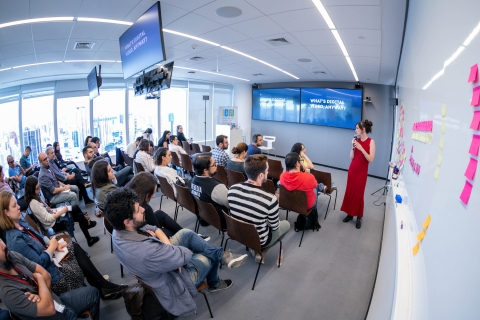
For the past few years, news publishers have pointed to online video as the next frontier — so much so that, beginning in 2015, many reorganized their entire newsrooms. This “pivot to video,” as it was dubbed, was so widespread that some newsrooms even laid off editorial staff to make room for video. But few achieved the success they had hoped for.
Guilherme Ravache, content director at Editora Perfil in São Paulo, Brazil, was hesitant to jump in. But as the opportunities for online video kept expanding with new tools like Instagram’s IGTV, he knew he couldn’t ignore it’s importance.
To better understand how to successfully approach online video, Ravache attended the Video Accelerator in São Paulo, organized by the International Center for Journalists in partnership with the Facebook Journalism Project. Upon returning from the first of three sessions in April, Ravache asked his team to completely revamp their video content across the entire company.
The team initiated a mobile-focused approach, ditching big cameras in favor of mobile phones. They adjusted their frames to leave space for graphics, used Skype for interviews and provided mobile phones for reporters to create their own videos. They also began scripting every video, something they hadn’t done before.
“For a long time, we used TV as an example,” said Vitor Balciunas, head of content at Editora Perfil. “It's not working anymore. So, we changed our framework, added some graphic resources and [made] our videos a little more catchy."
The team was worried that reducing the level of production might cost them their audience. “We actually got a surprise, and people started liking, commenting and sharing our videos so much more. Our numbers are growing every day,” Balciunas added.
The results have been huge levels of growth across social media platforms, and increased traffic to the publications’ websites. Facebook followers grew by nearly 50% in July for both their celebrity news website CARAS and their housekeeping magazine Ana Maria. CARAS has the most engaged Instagram news profile in Brazil, according to Executive Editor Camilla Queiroz.
Editora Perfil has grown its team significantly to keep up with the success. Before the Accelerator, three people produced three videos per day. In just one month, the team grew to 10 people. Today, four months later, a team of 15 produces 12 videos per day in almost 50 different formats. Queiroz said they plan to continue to grow to eventually produce 100 videos per week.
In August, five more people joined the video team as editors and distributors, and Ravache expects they’ll end the year with a team of 30. With a larger team moving forward, Editora Perfil hopes to stay on top of industry trends, including new platforms like Tik Tok, the social media app for creating short lip-sync and comedy videos, for one.
In the meantime, they’ll continue to try to monetize, while pushing out new content. Editora Perfil will be launching its first long-form video series later this summer, for example, on the LGBTQ community in Brazil.
This story first appeared on IJNet. Learn more about the Facebook Video and Reader Revenue Accelerator.
Taylor Mulcahey is the IJNet English and Engagement Editor, responsible for the website’s English-language content, social media and audience engagement.
To learn more about the Facebook Journalism Project's video accelerators in Brazil, check out these recaps: session 1, session 2, session 3, session 4, session 5.